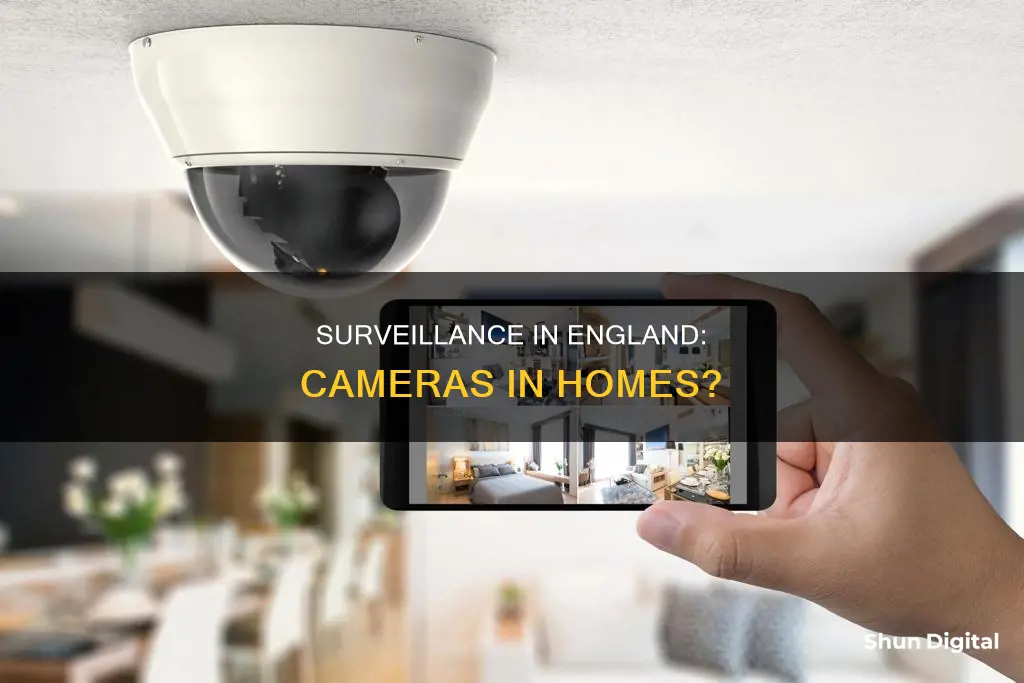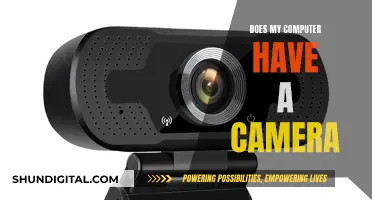
The use of surveillance cameras in England is a highly debated topic, with proponents arguing their effectiveness in crime prevention and law enforcement, while critics raise concerns about privacy invasion and the potential for abuse. While England has a high number of surveillance cameras in public spaces, the question remains – does the government install cameras in people's homes?
The answer is no. England does not have surveillance cameras installed in people's homes. The use of surveillance cameras in private residences is strictly regulated by laws and requires explicit consent from the individuals being monitored. However, advancements in technology have made it easier for individuals to voluntarily install surveillance cameras in their homes for security purposes.
So, while you won't find government-operated cameras in people's homes in England, the presence of privately-owned cameras in residential areas is not uncommon, as homeowners take security into their own hands.
| Characteristics | Values |
|---|---|
| Surveillance in private residences | Regulated by laws and requires consent from the individuals being monitored |
| Surveillance in public spaces | One of the highest numbers of CCTV cameras per capita in the world |
| Surveillance in residential areas | Not common for surveillance cameras to be installed inside private residences |
| Surveillance by consent | Emphasised in the Surveillance Camera Code of Practice |
| Surveillance camera operators | Charged with watching the live footage in a nearby monitoring suite |
| Data storage | Under high-security conditions |
| Data release | Upon request for legitimate purposes, such as criminal investigations |
| Data protection laws | Data Protection Act 2018, General Data Protection Regulation (GDPR), Human Rights Act 1998 |
| Surveillance laws | Regulation of Investigatory Powers Act 2000 (RIPA), Investigatory Powers Act 2016 (IPA) |
What You'll Learn

Surveillance in public spaces
The use of surveillance cameras in public spaces in England has been a topic of debate and controversy. Supporters argue that these cameras help prevent and solve crimes, providing valuable evidence for investigations, and acting as a deterrent. Critics, however, express concerns about privacy invasion and the potential for abuse of surveillance systems.
England has one of the highest numbers of CCTV cameras per capita in the world, and their use is regulated by laws such as the Data Protection Act 2018 and the General Data Protection Regulation (GDPR). These laws ensure that any surveillance measures respect individuals' right to privacy and are proportionate and necessary.
CCTV cameras are typically installed in public areas such as streets, parks, shopping centres, and transportation hubs. The use of these cameras is often justified by authorities as a means to enhance security and deter crime.
The effectiveness of CCTV cameras in preventing crime has been questioned, with studies showing mixed results. Some research suggests that the presence of cameras can lower crime rates and improve the quality of life for citizens, while other studies indicate a relatively low impact on crime rates and a potential invasion of privacy.
The placement and positioning of cameras are also important considerations. Good surveillance involves equipment that conforms to industry standards and is situated in locations where cameras are most needed and beneficial to the public.
Overall, the use of surveillance cameras in public spaces in England aims to balance security and liberty, ensuring that communities are kept safe while also defending the fundamental rights of citizens from disproportionate intrusion.
Vivitar Camera Charger: Troubleshooting Guide
You may want to see also

Regulation and privacy laws
The use of surveillance cameras in England is governed by a range of laws and regulations that protect individuals' privacy rights and ensure that surveillance is carried out in a lawful and ethical manner. Here is an overview of the key regulations and privacy laws pertaining to surveillance cameras in England:
- Data Protection Act 2018 (DPA): The DPA is a key piece of legislation that regulates the processing of personal data, including the use of surveillance cameras. It ensures that the processing of personal data is lawful, fair, and transparent, protecting the rights of individuals. The DPA applies when CCTV systems capture images outside the boundary of private domestic property, such as neighbours' homes, public areas, or shared spaces.
- General Data Protection Regulation (GDPR): The GDPR is a set of regulations that govern the use of personal data and applies in conjunction with the DPA. It provides individuals with rights such as the right to access and erase their personal data. The GDPR also requires that data controllers, such as homeowners with CCTV systems, comply with principles of necessity, proportionality, and transparency.
- Regulation of Investigatory Powers Act 2000 (RIPA): RIPA is a critical law that governs the interception of communications, covert surveillance, and the acquisition of communications data by public bodies. Under RIPA, public authorities like police forces and intelligence services must obtain a warrant approved by the Home Secretary or a designated official before conducting surveillance.
- Investigatory Powers Act 2016 (IPA): The IPA updates and consolidates the powers of public authorities to carry out surveillance activities. It includes guidelines for digital records and online communications. The IPA requires public authorities to obtain approval from both a judge and the Secretary of State.
- Human Rights Act 1998: This legislation incorporates the European Convention on Human Rights (ECHR) into UK law, including the right to privacy. Public authorities must ensure that any surveillance is proportionate, necessary, and does not unduly infringe on individuals' privacy rights.
- Protection of Freedoms Act 2012 (PoFA): The PoFA introduced measures to control the use of CCTV in public spaces in England and Wales. It also led to the creation of the role of the Surveillance Camera Commissioner (SCC), who is responsible for encouraging compliance with the Surveillance Camera Code of Practice. The SCC's code provides guidelines to ensure that surveillance camera systems are operated proportionately, transparently, and effectively.
- Guidelines and Recommendations: The Information Commissioner's Office (ICO), which enforces data protection laws, has published guidelines for domestic CCTV users. These guidelines include recommendations such as conducting a privacy impact assessment before installing CCTV and ensuring transparency by informing neighbours about the system.
In summary, the use of surveillance cameras in England is subject to strict regulations and privacy laws. These laws aim to protect individuals' privacy rights, ensure lawful and ethical surveillance practices, and promote transparency and accountability in the use of surveillance technology.
Charging Camera Batteries: USB Option for Photographers
You may want to see also

Use in residential areas
The use of surveillance cameras in residential areas in England is a complex and evolving topic. While England has a significant number of surveillance cameras in public spaces, the presence of cameras in people's homes is a different matter.
In general, it is not common for surveillance cameras to be installed inside private residences in England. The majority of surveillance cameras in residential areas are typically owned and operated by individuals or businesses to monitor their own property, rather than being part of a widespread government surveillance program. This means that the use of surveillance cameras in residential areas is largely a personal choice made by homeowners or communities, and it is not a widespread system implemented by the government.
However, it is worth noting that the use of surveillance cameras in residential areas has been a subject of debate and concern. Some homeowners and communities have chosen to install cameras on their properties as a security measure, particularly in response to rising crime rates or concerns about anti-social behaviour. These cameras are usually focused on the exterior of the property and are intended to deter potential criminals or provide evidence in the event of an incident.
It is important to highlight that the use of surveillance cameras in residential areas must comply with the law. The Information Commissioner's Office (ICO) provides guidelines on the use of CCTV cameras, emphasising the need for transparency, proportionality, and respect for privacy rights. Homeowners should inform individuals if their property is being monitored, and the footage should be used solely for security purposes.
In conclusion, while England does not have a widespread system of surveillance cameras in people's homes, the use of cameras in residential areas does occur, albeit on a smaller scale and as a personal choice. The latest perspective on this matter emphasises the importance of balancing security and privacy, with regulations and laws in place to protect individuals' rights.
Fighting Camera Tickets: Strategies for Success
You may want to see also

Public opinion
The use of surveillance cameras in England has been a topic of debate and controversy. While some argue that these cameras are essential for crime prevention and solving crimes, others express concerns about privacy invasion and the potential for abuse.
Proponents of surveillance cameras in public spaces argue that they help in preventing and solving crimes by providing valuable evidence for investigations. The presence of cameras also acts as a deterrent, making people think twice before engaging in illegal activities. The Data Protection Act 2018 and the General Data Protection Regulation (GDPR) govern the collection and use of personal data, ensuring individuals' right to privacy.
On the other hand, critics raise concerns about the constant monitoring of public spaces, infringing upon individuals' right to privacy and potentially leading to a surveillance state. The storage, ownership, and accessibility of recorded CCTV footage are also points of contention. The case of Geoffrey Peck, who attempted suicide in a public place and had his footage widely disseminated without his consent, highlighted the need for better protection of individual privacy.
The use of surveillance cameras in residential areas has been a subject of debate as well. While some homeowners and communities have chosen to install cameras for security, others view it as an invasion of privacy. The Information Commissioner's Office (ICO) provides guidelines on the use of CCTV cameras, emphasising transparency, proportionality, and respect for privacy rights.
Overall, public opinion on surveillance cameras in England is mixed. While some argue that the benefits of crime prevention and enhanced security outweigh the concerns, others believe that the potential invasion of privacy and the risk of abuse are too high. The latest perspective emphasises the need to balance security and privacy, with regulations and laws protecting individuals' rights.
Charging Your Sanyo E1090: Quick and Easy Guide
You may want to see also

Effectiveness of CCTV
The effectiveness of CCTV in reducing crime has been the subject of extensive research and debate. While some studies suggest that CCTV can reduce crime, others argue that its effectiveness depends on various factors, including the context in which it is used and how it is implemented.
One of the most comprehensive studies on the effectiveness of CCTV in the UK is the College of Policing's Crime Reduction Toolkit, which analysed 76 studies on the impact of CCTV on crime rates. The review found that overall, CCTV was associated with a statistically significant decrease in crime, with a 13% reduction in places with CCTV compared to those without. However, the effectiveness varied depending on the type of crime and the location. For example, drug-related crimes decreased by 20%, and vehicle and property crimes decreased by 14%, while no significant effect was observed for violent crimes.
The review also suggested that the effectiveness of CCTV is influenced by factors such as increasing the actual and perceived risk of getting caught, encouraging the public to use an area, improving citizen awareness, and reducing criminal opportunities. Additionally, active monitoring of CCTV footage by trained staff was found to be more effective in reducing crime than passive surveillance.
Another study by Piotr Matczak et al. analysed the cost-effectiveness of CCTV surveillance systems in Poznan, Poland. The study found that while CCTV can be effective in reducing certain types of crimes, such as car-related crimes, it may not be cost-effective in most areas. The analysis suggested that the development of CCTV surveillance should be cautious and consider the target crime types and associated costs, including social costs and benefits.
In England, the use of CCTV in public spaces has been a topic of debate, with supporters arguing that it helps prevent and solve crimes, while critics raise concerns about privacy invasion. The government has introduced guidelines and regulations to balance security and individual rights, emphasising the need for transparency and accountability in the use of CCTV systems.
In conclusion, while CCTV can be an effective tool for crime reduction in certain contexts, its effectiveness is influenced by a range of factors, including the type of crime, location, and how the system is implemented and monitored. Additionally, considerations regarding cost-effectiveness and privacy concerns play a crucial role in the deployment of CCTV systems.
Focusing Telescope Images: Camera Setup Guide
You may want to see also
Frequently asked questions
No, England does not have surveillance cameras in people's homes. The use of surveillance cameras in private residences is regulated by laws and requires consent from the individuals being monitored.
There are several laws governing surveillance in England, including the Regulation of Investigatory Powers Act 2000 (RIPA), the Investigatory Powers Act 2016 (IPA), the Data Protection Act 2018, and the Human Rights Act 1998. These laws outline the rules for interception of communications, covert surveillance, and the protection of personal data.
The use of surveillance cameras, particularly in public spaces, has raised concerns about privacy invasion and the potential for abuse. The Data Protection Act 2018 and the General Data Protection Regulation (GDPR) provide individuals with rights to access and control their personal data, including footage from surveillance cameras. However, critics argue that the widespread use of cameras infringes upon the right to privacy and can lead to a surveillance state.







